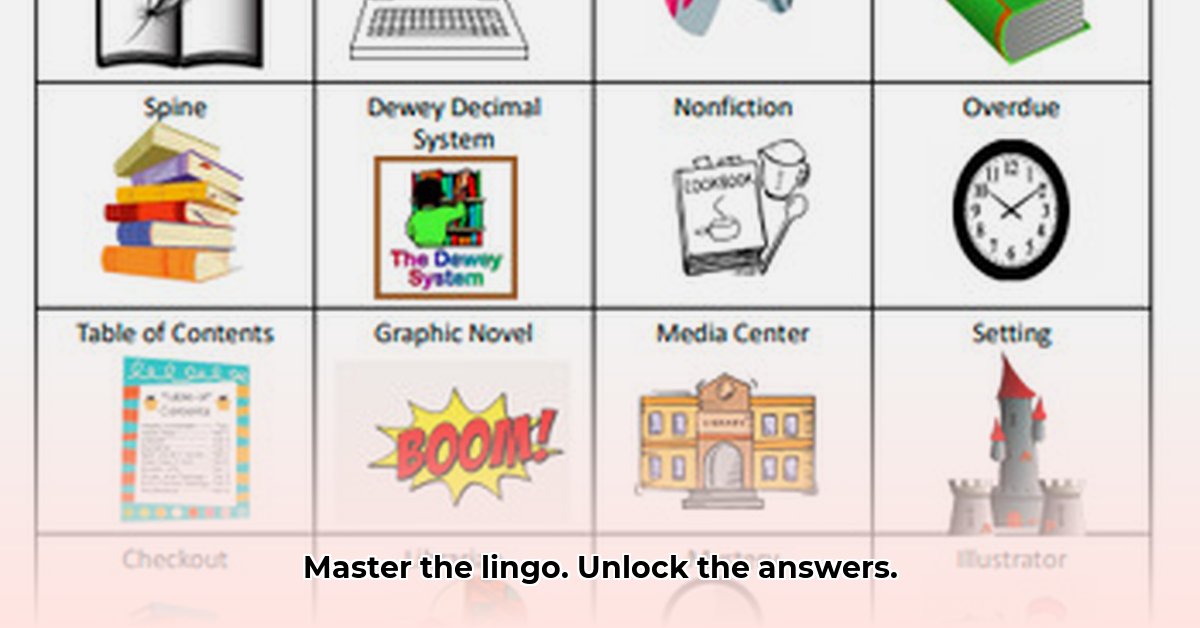
Deciphering Jargon: Your Guide to Mastering Specialized Language
Feeling lost in a sea of industry jargon? This guide provides your "know the lingo answer key," empowering you to confidently navigate specialized vocabulary across any field. We'll explore effective learning strategies, dispel common misconceptions, and equip you with the tools to not only understand but truly master complex terminology.
Understanding Jargon: More Than Just Buzzwords
Jargon, often perceived as overly technical language, serves a crucial purpose within specific fields. It allows experts to communicate efficiently and precisely. However, this specialized language can create barriers for those outside the field. This guide acts as your translator, bridging the gap between technical expertise and general understanding. Think of it as unlocking a secret code to unlock deeper understanding and effective communication.
The Benefits of Mastering Jargon: Beyond Simple Comprehension
Understanding jargon isn't merely about sounding knowledgeable; it's about gaining a deeper understanding of the subject matter itself. Mastering the language of a field allows for more meaningful participation in discussions, a clearer grasp of complex concepts, and even a competitive edge in your career. It’s about gaining true expertise and unlocking greater opportunities. A strong grasp of jargon is a powerful tool for both personal and professional growth.
How to Effectively Use Your "Know the Lingo Answer Key"
Using this guide effectively is more than just passively reading through definitions. It's a structured approach to learning and comprehension.
- Identify the Unknown: Pinpoint the terms causing confusion. Jot them down—this step strengthens memory.
- Consult the Key: Look up the definitions. Don't just read; analyze the meaning and context.
- Seek Real-World Applications: Find examples of how the terms are used in practice. Contextual understanding improves retention significantly.
- Practice Active Use: Incorporate the new terms into conversations and writing. Active application reinforces memory.
- Maintain Regular Review: Schedule time for review. Consistency is vital for long-term retention. Regular reinforcement is key to mastering new vocabulary.
Different Types of "Know the Lingo Answer Keys"
The format of your "know the lingo answer key" depends heavily on its purpose:
- Technical Glossaries: These offer detailed definitions of terms within a specific field, like a medical glossary.
- Slang Dictionaries: These focus on informal language, highlighting regional or cultural variations.
- Test Answer Keys: These provide answers and explanations for quizzes or exams, promoting deeper learning.
- Myth-Busting Guides: These clarify common misconceptions surrounding certain terms, ensuring accurate understanding.
Is a "Know the Lingo Answer Key" Right for You?
While answer keys offer significant advantages, potential drawbacks should be considered:
| Advantages | Potential Drawbacks |
|---|---|
| Enhanced understanding | Over-reliance hindering independent learning |
| Vocabulary expansion and fluency | Risk of rote memorization without comprehension |
| Improved communication and collaboration | May not cover all nuances of a specific term |
| Accelerated learning | Requires active engagement and critical thinking |
Ultimately, mastering jargon is about genuine understanding, not mere memorization. This guide serves as a powerful learning tool, but your active participation is the key to success. Engage actively, explore persistently, and embrace the learning process.
Boosting Long-Term Retention: The Power of Digital Flashcards
Digital flashcards offer a revolutionary approach to learning and retaining new vocabulary. They leverage spaced repetition, a technique proven to significantly improve memory retention. By strategically scheduling reviews, digital flashcards ensure that information is revisited just before it's likely to be forgotten, maximizing long-term retention.
Key Advantages of Digital Flashcards:
- Spaced Repetition: Optimizes learning by reviewing material at increasing intervals.
- Personalization: Adapts to individual learning styles and paces.
- Accessibility: Allows for convenient access to study materials anytime, anywhere.
- Enhanced Engagement: Interactive features and multimedia options boost learning.
Creating Effective Digital Flashcards:
- Identify Key Terms: List the vocabulary to be learned.
- Concise Card Design: Keep the front (the term) and back (definition/example) brief and focused.
- Use Visuals: Images and diagrams enhance understanding and memory.
- Active Recall: Regularly test yourself, actively recalling information from memory.
Mastering new terminology requires a strategic approach. Leverage this guide and the power of digital flashcards, employing techniques like spaced repetition, to unlock your full potential. Continuous engagement is the key – not just to learning, but true mastery of any specialized language.